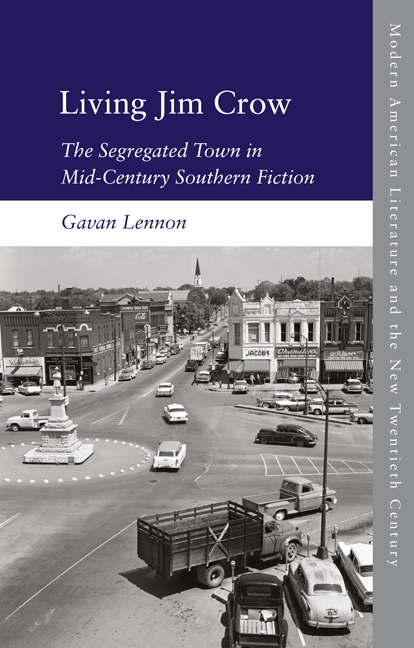Book contents
- Frontmatter
- Contents
- Acknowledgements
- Introduction: Uncovering a Poetics of Protest
- 1 Creators of the Small Town: Anthropology, Racial Etiquette and African American Fiction in the 1930s
- 2 The White Town/Coloured Town Paradigm: Lillian Smith’s Maxwell
- 3 An Anatomy of Critique: Byron Herbert Reece’s Tilden
- 4 The Milan Cycle: Carson McCullers’s Milan
- 5 Breaking the Pencil: William Faulkner’s Jefferson
- 6 Knowing How to Curse: William Melvin Kelley’s Sutton
- Conclusion: (De)Generative Ground – The Field and the Segregated Town
- Notes
- Bibliography
- Index
6 - Knowing How to Curse: William Melvin Kelley’s Sutton
Published online by Cambridge University Press: 15 October 2020
- Frontmatter
- Contents
- Acknowledgements
- Introduction: Uncovering a Poetics of Protest
- 1 Creators of the Small Town: Anthropology, Racial Etiquette and African American Fiction in the 1930s
- 2 The White Town/Coloured Town Paradigm: Lillian Smith’s Maxwell
- 3 An Anatomy of Critique: Byron Herbert Reece’s Tilden
- 4 The Milan Cycle: Carson McCullers’s Milan
- 5 Breaking the Pencil: William Faulkner’s Jefferson
- 6 Knowing How to Curse: William Melvin Kelley’s Sutton
- Conclusion: (De)Generative Ground – The Field and the Segregated Town
- Notes
- Bibliography
- Index
Summary
In an essay for a 1968 issue of The Partisan Review, poet Calvin Israel recalls a chance meeting with William Faulkner in Washington Square Park in New York in 1956. The title of the article, ‘The Last Gentleman’, is suggestive of Walker Percy's 1966 novel of the same name and positions Faulkner as the last vestige of a southern literary aristocracy. Israel describes the ageing Nobel Laureate as ‘a quiet center of great activity’ amid the bustle of the city park. When Israel notices Faulkner's ‘detachment’ from people around them, he confronts the author about his controversial stated views on racial gradualism. Faulkner responds with the single word ‘Violence’ before abruptly ending the encounter. Israel underscores Faulkner's legacy as it was understood in the late 1960s: he is made redolent of a lost tradition and epitomises a failure to act against racial segregation.
Coincidentally, Israel's memoir of Faulkner is preceded in the same edition of The Partisan Review by ‘An Appeal’ issued by John Young, Chairman of the Boston chapter of the Congress of Racial Equality (CORE). Young's letter makes a plea for aid to ‘Negroes in rural Mississippi areas subsisting partially on grass, and begging for food and / or money at Civil Rights headquarters in their various localities’. Poverty and hunger are presented as facts of life in the ‘various localities’ of typical southern towns. Young's emphasis on how a clear and present threat to black life exists ‘not in some economically backward country … [but] in the United States of America, the richest country on Earth’ throws Faulkner's anachronistic gradualism into relief. Young's and Israel's very different pieces of writing represent two voices in the discourse of race in the South at the end of the 1960s. The same issue's main feature, a symposium of black and white intellectuals on the topic of Black Power, represents still more voices. Included in the (all-men) group of black and white activists are Ivanhoe Donaldson and Abbie Hoffman, Norman Mailer and Nathan Wright Jr. and New York–born African American novelist William Melvin Kelley.
- Type
- Chapter
- Information
- Living Jim CrowThe Segregated Town in Mid-Century Southern Fiction, pp. 183 - 209Publisher: Edinburgh University PressPrint publication year: 2020



